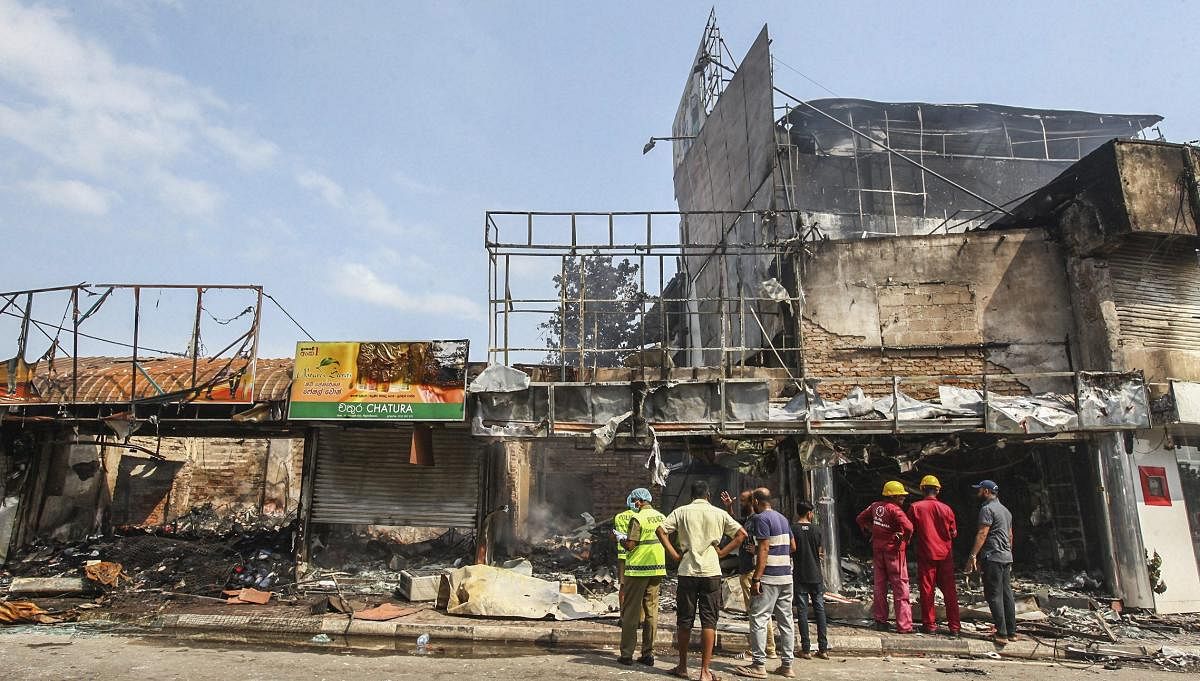
Parts of Sri Lanka were under indefinite curfew Tuesday and social media banned after a man was killed by a sword-wielding mob in an escalating anti-Muslim backlash following the Easter terror attacks.
Violence broke out late Monday, three weeks after Islamist extremist bombings killed 258 people, with mobs carrying out arson attacks including one involving around 2,000 people who vandalised a mosque, witnesses said.
A nationwide curfew imposed overnight was raised on Tuesday morning except for the North-Western Province (NWP) where police said a 45-year-old Muslim man was killed in his carpentry shop by a crowd carrying swords.
Elsewhere in the province north of Colombo rampaging mobs, who outnumbered police and security forces, set fire to Muslim-owned shops, vandalised homes and smashed windows, furniture and fittings inside several mosques.
In the adjoining Gampaha district, men on motorbikes led arson attacks in the town of Minuwangoda, 45 kilometres (30 miles) north of Colombo, local residents told AFP.
"It was the men on motorbikes who started the violence. They were from out of town," an owner of an electronic goods store told AFP by telephone.
"After they started smashing Muslim shops and throwing petrol bombs, the locals joined in."
He said police and security forces appeared to be overwhelmed and that by the time troops fired in the air to disperse the mobs it was too late for many of the shops targeted.
A pasta factory owned by a Muslim businessman was destroyed after unidentified attackers threw burning tyres into the facility, reducing it to ashes.
"There were security forces outside, but they could not stop the attack that happened during curfew hours," the owner of the Diamond Pasta Private Limited, Ashraf Jifthy told AFP by telephone.
"Police and security forces also did not do anything to put out the fire," Jifthy said. "Three of my Muslim workers were injured while trying to escape from the burning factory."
A mosque in Minuwangoda was also stoned.
In the NWP, attackers systematically targeted mosques for two days, local clerics told AFP. In the town of Kinyama, two mosques were smashed as the outnumbered armed police and troops stood by.
"About 2,000 people surrounded our mosque and smashed everything inside, even the bathroom fittings," cleric M. I. M. Siddeeque told AFP by telephone from the curfew-bound town of Bingiriya.
Video footage of the unrest showed burning shops as mobs armed with sticks and stones roamed on the streets attacking Muslim-owned shops.
Police said the curfew in the NWP would continue until further notice.
"Security forces are assisting police who have been ordered to use maximum force to contain the violence," police spokesman Ruwan Gunasekera said.
Police said they fired in the air and used tear gas at several places to deter people attempting to attack mosques.
Political commentator Victor Ivan suggested that the violence was politically orchestrated.
"The opposition feels that they can gain when there is instability and the government appears to be weak," Ivan told AFP. "There is evidence of junior level opposition figures instigating communal violence."
He said the country's political establishment, including the opposition, had failed to provide leadership and restore confidence after the April 21 attacks claimed by the Islamic State group.
In an address to the nation on Monday night, Prime Minister Ranil Wickremesinghe said the unrest would hinder investigations into the attacks that targeted three churches and three luxury hotels.
In a separate TV address, police chief Chandana Wickramaratne warned of stern action against rioters, and said that constables have been issued orders to use maximum force.
The attacks came during the Muslim holy fasting month of Ramadan. Muslims make up around 10 percent of Buddhist-majority Sri Lanka's population and Christians about 7.6 percent.
A state of emergency has been in place since the bombings and security forces have been given sweeping powers to detain suspects.
The latest wave of unrest started when a mob targeted Muslim-owned shops in the town of Chilaw, 80 kilometres (50 miles) north of Colombo, on Sunday in anger at a Facebook post by a shopkeeper.
Internet service providers said the telecoms regulator on Tuesday extended a social media ban to Twitter. Earlier, Facebook, WhatsApp, YouTube and Instagram had been blocked to prevent the spread of messages inciting violence.
Sri Lankan cricket legend Kumar Sangakkara was among those to call for calm, earlier tweeting: "STOP. BREATHE. THINK. OPEN YOUR EYES. If we lose ourselves in violence, racism, thuggery and hatred we lose our country."